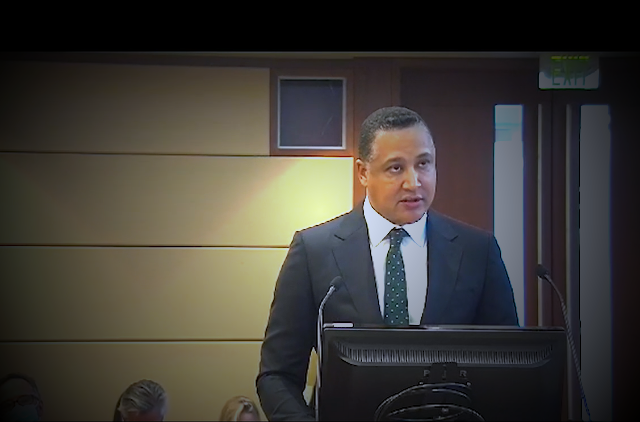Little Financial Oversight of Seattle Police Federal Monitor

The Seattle Police Department’s (SPD) federal consent decree Monitor, Antonio Oftelie, has not posted a single update to the monitoring team’s website since December 2023, despite receiving numerous payments from the U.S. District Court in Seattle.
That might not be the only area of his oversight that’s lacking attention.
Since Oftelie was appointed Monitor of the SPD in 2020, the federal court in Seattle has disbursed $635,741 to an entity named “LNW Group LLC” according to the case docket. No such entity is registered as a business in Washington State.
HardPressed made an inquiry with the Washington State Department of Revenue (DOR), asking if any investigation or audit into Oftelie’s business was ongoing. The DOR told HardPressed that “information regarding if an investigation took place or what was determined after that would be information that is not releasable.”
Oftelie himself operates as a consultant across the United States, and has hosted numerous events at Harvard University under the banner of Leadership for a Networked World (LNW), which according to the group’s website is “an initiative of Dr. Antonio M. Oftelie.”
A search for business entities in Massachusetts turns up an “LNW Group LLC” that was started in 2008 and dissolved in 2011. The Office of the Secretary of the Commonwealth told HardPressed that Oftelie’s entity in Massachusetts “was administratively dissolved by our office, as it never filed an annual report. Our office typically dissolves LLCs after two consecutive years of failure to file annual reports. This LLC failed to file an annual report in 2009 and 2010 and was dissolved in 2011.”
In Minnesota, Oftelie’s Leadership for a Networked World received $400,000 to produce the “Safe and Thriving Communities” report under an LNW Group LLC contract with the city of Minneapolis. A search of Minnesota Secretary of State business filings shows that Oftelie started an “LNW Group LLC” in 2010 which was later administratively terminated in 2013.
A customer service specialist for the Minnesota Secretary of State told HardPressed in an email that it appeared Oftelie’s Minnesota LNW Group LLC was inactive “for failure to file their annual renewal in 2011.” She further told HardPressed that the Secretary of State does “not monitor whether they are still providing goods or services to customers.”
In certain federal court cases, such as Seattle’s consent decree, a federal Judge may order access to deposit funds into the court’s Registry, which provides an account that payments can be drawn from through an order of the court. This is how Oftelie is paid, through Registry disbursements ordered by Judge James Robart.
HardPressed asked the federal court in Seattle if it provides an Internal Revenue Service (IRS) Form 1099 with reportable earnings to Oftelie’s business. Shannon Gregor, a financial specialist for the court wrote to HardPressed that, “In general, the Court only sends out 1099 forms for interest earned on funds deposited in Registry cases.” When HardPressed asked the court to confirm that Oftelie’s business has not been provided with a Form 1099, Gregor responded, “There’s no change to our previous response.”
Upon each individual Registry payment, the city of Seattle reimburses the court for the amount paid to the Monitor. Local Civil Rule 67 states that “a completed IRS W-9 form from each disbursement recipient must be emailed to the Clerk’s Office Finance Department… but shall not be filed in the record.” When asked if Oftelie has filed a W-9 with the court, Gregor responded that, “The judiciary uses an equivalent form for payments to vendors where the funds come from deposits ordered by the court on one of the parties. That form was submitted and verified.”
Gregor provided a blank copy of that equivalent form, writing to HardPressed that “it is not an IRS form,” and that “the obligation for tax reporting is on the parties” the court pays through disbursements.
HardPressed asked Oftelie directly if LNW Group LLC is an operating business entity anywhere within the United States and if Oftelie pays federal income taxes on earnings received from the Pohlad Family Foundation, McKnight Foundation, Minneapolis Foundation, the Joyce Foundation in Minnesota, and from the federal court in Seattle.
He did not respond to numerous requests for comment.
Seattle’s associate federal Monitors, Ron Ward, Matthew Barge, and Vanessa Wheeler, were also asked by HardPressed if Oftelie provides them with an IRS Form 1099. No one responded.
HardPressed recently made a FOIA request to the DOJ, seeking communications between officials representing the DOJ within Seattle’s consent decree and Oftelie himself. The DOJ categorically denied the FOIA request in full, writing that the disclosure of the records “could reasonably be expected to interfere with law enforcement proceedings.”
The concerning personal and financial relationships between Oftelie and SPD executives, questions raised by FOIA denials from the DOJ and Oftelie’s silence in response to basic questions regarding his business, increasingly reveal Seattle’s federal consent decree as a maze of non-accountability. All of it paid for by Seattle taxpayers.
The DOJ in Seattle declined to comment.

